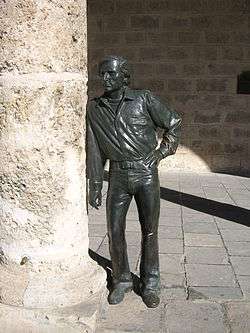Antonio Gades

Antonio Gades (14 November 1936 – 20 July 2004) was a Spanish flamenco dancer and choreographer (born Antonio Esteve Ródenas in Elda, Alicante, Spain). He helped to popularise the art form on the international stage.
Career
Flamenco
Gades's most notable works included dance adaptations of Prosper Merimée's Carmen and Federico García Lorca's Blood Wedding (Bodas de Sangre), as well as a feature-length adaptation of Manuel de Falla's 23-minute ballet El Amor Brujo.
In the 1990s, he toured the world with his show Fuenteovejuna, based on Lope de Vega's play of the same name.
Film
He collaborated closely with the Spanish director Carlos Saura in the filming of the adaptations of Carmen and Blood Wedding, which also featured Cristina Hoyos, one of the most prolific contemporary female flamenco dancers.
Ballet
He also co-founded and became the artistic director of the Spanish National Ballet (Ballet Nacional de España) in 1978.
Personal and death
Gades was prominent as a political activist in Alicante, where he proclaimed self-determination for the Catalan nation during the Spanish Transition between the late 1970s and early 1980s. He was a member of the Central Committee of the Communist Party of Peoples of Spain, a Marxist-Leninist organization. In 1987 he was a member of the jury at the 15th Moscow International Film Festival.[1]
He was married to the Spanish actress and singer Marisol for 4 years; they had three daughters.
He died in Madrid after suffering from cancer for a long time.
Awards
About six weeks before his death, Gades received the "Order of José Marti", one of the highest honors of Cuba, from the Cuban leader Fidel Castro, in Havana, Cuba.
In 2004 his ashes were interred at the Mausoleum of the Frank País Second Eastern Front, a memorial cemetery in Santiago de Cuba.
Filmography
- Los Tarantos 1963
- With the East Wind 1966
- El amor brujo 1967
- The Last Meeting 1967
- Bodas de sangre 1981
- Carmen 1983
- El amor brujo 1986
References
- ↑ "15th Moscow International Film Festival (1987)". MIFF. Archived from the original on 2013-01-16. Retrieved 2013-02-18.
External links
- Ermanna Carmen Mandelli, Antonio Gades. Palermo, L'Epos, 2004. ISBN 88-8302-235-1
- Cuban Government's webpage on Gades
- Antonio Gades biography and films or products in which he has taken part
- IMDB.com